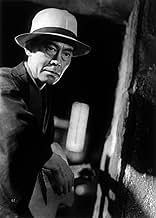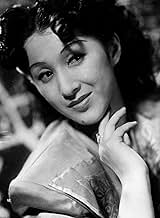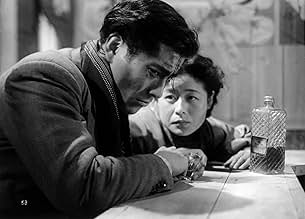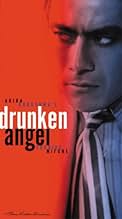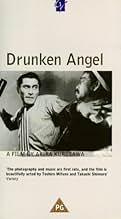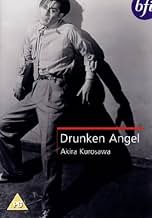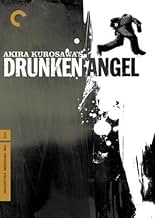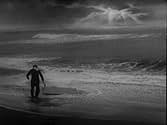VALUTAZIONE IMDb
7,6/10
14.139
LA TUA VALUTAZIONE
Un medico ubriaco dal temperamento focoso e un gangster incline alla violenza affetto da tubercolosi formano un legame d'argento vivo.Un medico ubriaco dal temperamento focoso e un gangster incline alla violenza affetto da tubercolosi formano un legame d'argento vivo.Un medico ubriaco dal temperamento focoso e un gangster incline alla violenza affetto da tubercolosi formano un legame d'argento vivo.
- Regia
- Sceneggiatura
- Star
- Premi
- 4 vittorie totali
Mayuri Mokushô
- Daughter at Flower Shop
- (as Kumiko Mokushô)
Recensioni in evidenza
This is a strange film about a very committed but screwed up doctor in post-war Japan. The doctor lives in the slums of Tokyo and is amazed at the filth and widespread incidence of preventable diseases among the poor. While this is an important cause to him, so is getting drunk and screwing up his life. However, the doctor meets a young hoodlum, played by Toshiro Mifune, and he treats him even when the guy insists everything is just fine! And, at times afterwards, Mifune alternates from being thankful and decent to being belligerent and completely antisocial. Throughout the film, the doctor works hard to keep this unlikable character alive--despite it seeming pretty obvious that Mifune has a death wish. A fascinating and odd story about the relationship between two very oddly matched men.
Kurosawa began his career as a jobbing director, making the pictures the studio wanted him to in conventional, by-the-book style. It was with Drunken Angel, his eighth film, that he turned a corner. He regarded it as the first film that was really his, and typically here combining bold social commentary with tender sympathy towards flawed and downtrodden characters.
This also marks the beginning of one of the greatest actor-director relationships in the history of cinema, with the young Toshiro Mifune making his debut for Kurosawa. It is amazing how naturally talented an actor Mifune was. He already knew exactly how to move in front of the camera, and could convey so much with the tiniest of gestures. However, he doesn't get to show off his full range here. Also, in the leading role, is Kurosawa regular and fantastic character actor Takashi Shimura. There isn't really one bad performance in the whole thing.
Drunken Angel is essentially a lament for the state of post-war Japanese society. Not only does the story concern the victims of that era, it is also an extended allegory using illness and contamination as a metaphor for the state of the nation. The central characters a tubercular gangster (Mifune) and an alcoholic doctor (Shimura) are partly to blame for their own conditions, and while they want to get better haven't the willpower to do so. The pond of stagnant water outside the doctor's surgery, a constantly recurring image of despair, seems to be the result of a bomb crater from the war.
The plot structure is episodic and bitty, somewhat reminiscent of neo-realist cinema. Unfortunately this makes the whole thing a bit lacking in pace and even boring in places. Things really start to pick up in the second half of the film when the plot starts to come together. The introduction of Okada, a gangland boss who has just finished a stint in prison, adds an element of danger to what has so far only been a gloomy drama.
Music is a constant presence in Drunken Angel, with diagetic music (i.e. really there in the scene rather than a background score) being used to give atmosphere and introduce characters. A whole variety of tunes are heard blasting from bars and dance halls, but most memorable of all is a man who sits outside the surgery playing a dismal Japanese folk melody on an acoustic guitar. This acts like a theme tune for the doctor. However, when Okada appears he takes the guitar and announces his presence by playing a doom-laden classical piece. This seems to have been a major influence on Sergio Leone, particularly on the character of Harmonica in his Once Upon a Time in the West (1968).
It is in the final act of this picture that Kurosawa reveals his talent for deeply sentimental and emotional direction. I won't reveal exactly what happens, but as the film looks set to reach a tense finale (in what is the only proper action sequence) Kurosawa turns it on its head, using expert timing, camera-work, cross-cutting and Fumio Hayasaka's score to produce a scene of incredible poignancy. Another Kurosawa trademark which is established here was his way of injecting a little note of hope into the ending of his darker pessimistic pictures, with the final scene suggesting there may be a cure for this sick society.
Despite all these developments in Kurosawa's style, he was not quite yet ready to turn out a masterpiece. In some ways he seems to have simply crammed every idea he had at the time into the 95 minutes. There is even a dream sequence in which Mifune smashes open a coffin is chased by a zombie version of himself. This hints towards Kurosawa's later horror-tinged work and a similar but better done scene in Kagemusha (1980), but here it seems a little clichéd and very much at odds with the overall tone of the film. Drunken Angel has its moments and is packed with good elements, which is why I rate it as highly as I do, but as a whole it doesn't come together enough to really suck the viewer in.
This also marks the beginning of one of the greatest actor-director relationships in the history of cinema, with the young Toshiro Mifune making his debut for Kurosawa. It is amazing how naturally talented an actor Mifune was. He already knew exactly how to move in front of the camera, and could convey so much with the tiniest of gestures. However, he doesn't get to show off his full range here. Also, in the leading role, is Kurosawa regular and fantastic character actor Takashi Shimura. There isn't really one bad performance in the whole thing.
Drunken Angel is essentially a lament for the state of post-war Japanese society. Not only does the story concern the victims of that era, it is also an extended allegory using illness and contamination as a metaphor for the state of the nation. The central characters a tubercular gangster (Mifune) and an alcoholic doctor (Shimura) are partly to blame for their own conditions, and while they want to get better haven't the willpower to do so. The pond of stagnant water outside the doctor's surgery, a constantly recurring image of despair, seems to be the result of a bomb crater from the war.
The plot structure is episodic and bitty, somewhat reminiscent of neo-realist cinema. Unfortunately this makes the whole thing a bit lacking in pace and even boring in places. Things really start to pick up in the second half of the film when the plot starts to come together. The introduction of Okada, a gangland boss who has just finished a stint in prison, adds an element of danger to what has so far only been a gloomy drama.
Music is a constant presence in Drunken Angel, with diagetic music (i.e. really there in the scene rather than a background score) being used to give atmosphere and introduce characters. A whole variety of tunes are heard blasting from bars and dance halls, but most memorable of all is a man who sits outside the surgery playing a dismal Japanese folk melody on an acoustic guitar. This acts like a theme tune for the doctor. However, when Okada appears he takes the guitar and announces his presence by playing a doom-laden classical piece. This seems to have been a major influence on Sergio Leone, particularly on the character of Harmonica in his Once Upon a Time in the West (1968).
It is in the final act of this picture that Kurosawa reveals his talent for deeply sentimental and emotional direction. I won't reveal exactly what happens, but as the film looks set to reach a tense finale (in what is the only proper action sequence) Kurosawa turns it on its head, using expert timing, camera-work, cross-cutting and Fumio Hayasaka's score to produce a scene of incredible poignancy. Another Kurosawa trademark which is established here was his way of injecting a little note of hope into the ending of his darker pessimistic pictures, with the final scene suggesting there may be a cure for this sick society.
Despite all these developments in Kurosawa's style, he was not quite yet ready to turn out a masterpiece. In some ways he seems to have simply crammed every idea he had at the time into the 95 minutes. There is even a dream sequence in which Mifune smashes open a coffin is chased by a zombie version of himself. This hints towards Kurosawa's later horror-tinged work and a similar but better done scene in Kagemusha (1980), but here it seems a little clichéd and very much at odds with the overall tone of the film. Drunken Angel has its moments and is packed with good elements, which is why I rate it as highly as I do, but as a whole it doesn't come together enough to really suck the viewer in.
Drunken Angel returns Toho to their bleak, dark roots and on this occasion it certainly worked no end.
It tells the story of the tremulous relationship between an alcoholic doctor and his violent mafia member patient. The doctor see's his younger self in the Yakuza and set's about going the extra mile to help him despite being fought every stage along the way.
After a series of mediocre Toho films I was already losing faith in the Kurosawa hype, therefore this came as a really pleasant surprise to me.
Powerful, hard hitting and wonderfully constructed Drunken Angel is by far the best Toho movie I've seen thus far.
The Good:
Well written
Some poignant moments
The Bad:
Things I Learnt From This Movie:
Bullets come out of a persons body in the same condition they went in
I'd have let them get typhus......and that's reason no.57579853789 why I should never have kids
It tells the story of the tremulous relationship between an alcoholic doctor and his violent mafia member patient. The doctor see's his younger self in the Yakuza and set's about going the extra mile to help him despite being fought every stage along the way.
After a series of mediocre Toho films I was already losing faith in the Kurosawa hype, therefore this came as a really pleasant surprise to me.
Powerful, hard hitting and wonderfully constructed Drunken Angel is by far the best Toho movie I've seen thus far.
The Good:
Well written
Some poignant moments
The Bad:
Things I Learnt From This Movie:
Bullets come out of a persons body in the same condition they went in
I'd have let them get typhus......and that's reason no.57579853789 why I should never have kids
I loved this movie for many reasons:
The film history : it's the first collaboration between Akira Kurosawa (director) and Toshiro Mifune (actor) that continued through 15 more films including the sublime Rashomon, Seven Samurai and Yojimbo.
The style : it's a great film noir with gangsters, zoot suits, speakeasy's, gambling etc.,
The history : post WW II Japan is a frightening place with rubble, raw sewage, crime and hope. It's a world I hadn't seen before.
Toshiro Mifune : What an amazing actor. He oozes charisma and you cannot take your eyes off of him. His performance reminded me of the first time I saw Russell Crowe, in a little seen mediocre movie called "For the Moment" which I watched many times because of Crowe's intensity.
My only problem is the copy I saw was terrible. The print was faded and half of the subtitles were illegible. When will this be released on DVD? It's not Kurosawa's best film, but it's certainly better than most of the drivel out there.
The film history : it's the first collaboration between Akira Kurosawa (director) and Toshiro Mifune (actor) that continued through 15 more films including the sublime Rashomon, Seven Samurai and Yojimbo.
The style : it's a great film noir with gangsters, zoot suits, speakeasy's, gambling etc.,
The history : post WW II Japan is a frightening place with rubble, raw sewage, crime and hope. It's a world I hadn't seen before.
Toshiro Mifune : What an amazing actor. He oozes charisma and you cannot take your eyes off of him. His performance reminded me of the first time I saw Russell Crowe, in a little seen mediocre movie called "For the Moment" which I watched many times because of Crowe's intensity.
My only problem is the copy I saw was terrible. The print was faded and half of the subtitles were illegible. When will this be released on DVD? It's not Kurosawa's best film, but it's certainly better than most of the drivel out there.
Drunken Angel (1948)
*** (out of 4)
Straight-forward and simple drama about the troubled relationship between a low level gangster (Toshiro Mifune) dying of tuberculosis and the drunken doctor (Takashi Shimura) trying to save him during post-war Japan. There are a lot of different genres on display in this early Kurosawa film including noir, gangster and an odd couple drama. The three don't always mix too well together but Kurosawa's great direction mixed with the great lead performances make this a must see even if the gang would go onto much better films. What works the best here are the performances by Shimura and Mifune. The two men work extremely well together because they make their characters so well rounded to the point where you feel as if you know everything about the men. Mifune really digs deep into the gangster and this leads to many well acted scenes including the drunken one where the gangster must finally realize how serious his disease is. Shimura clearly steals the film as the angry and often times bitter, if still caring, drunken doctor. The amount of anger he displays with his character while still making us understand why he cares so much is perfectly done by the actor. Cheiko Nakakita and Reizaburo Yamamoto are also very good in their supporting roles of the nurse and gang boss. The cinematography is also top-notch especially a dream like sequence where the dying gangster invisions himself as a zombie-like creature. This scene is very effective as is another where spitting blood is involved. I think at times the film is way too over dramatic and this includes many scenes dealing with the "swampness" of Japan. Even with that said, this is still a very impressive drama that fans of Kurosawa will want to check out.
*** (out of 4)
Straight-forward and simple drama about the troubled relationship between a low level gangster (Toshiro Mifune) dying of tuberculosis and the drunken doctor (Takashi Shimura) trying to save him during post-war Japan. There are a lot of different genres on display in this early Kurosawa film including noir, gangster and an odd couple drama. The three don't always mix too well together but Kurosawa's great direction mixed with the great lead performances make this a must see even if the gang would go onto much better films. What works the best here are the performances by Shimura and Mifune. The two men work extremely well together because they make their characters so well rounded to the point where you feel as if you know everything about the men. Mifune really digs deep into the gangster and this leads to many well acted scenes including the drunken one where the gangster must finally realize how serious his disease is. Shimura clearly steals the film as the angry and often times bitter, if still caring, drunken doctor. The amount of anger he displays with his character while still making us understand why he cares so much is perfectly done by the actor. Cheiko Nakakita and Reizaburo Yamamoto are also very good in their supporting roles of the nurse and gang boss. The cinematography is also top-notch especially a dream like sequence where the dying gangster invisions himself as a zombie-like creature. This scene is very effective as is another where spitting blood is involved. I think at times the film is way too over dramatic and this includes many scenes dealing with the "swampness" of Japan. Even with that said, this is still a very impressive drama that fans of Kurosawa will want to check out.
Lo sapevi?
- QuizIn early drafts of the script, the story was almost entirely about Doctor Sanada (Takashi Shimura) and Matsunaga the thug (Toshirô Mifune) was a small supporting part. However, Akira Kurosawa was so impressed with Mifune's performance that he greatly increased the Matsunaga part, to the point where the Doctor and Matsunaga are almost equal in screen-time.
- BlooperEven though the story takes place during the hot summer, breath can be seen coming from characters in several scenes.
- Citazioni
Dr. Sanada: The Japanese love to sacrifice themselves for stupid things.
- ConnessioniFeatured in Kurosawa and the Censors (2007)
I più visti
Accedi per valutare e creare un elenco di titoli salvati per ottenere consigli personalizzati
- How long is Drunken Angel?Powered by Alexa
Dettagli
Botteghino
- Lordo Stati Uniti e Canada
- 46.808 USD
- Fine settimana di apertura Stati Uniti e Canada
- 15.942 USD
- 28 lug 2002
- Lordo in tutto il mondo
- 47.023 USD
- Tempo di esecuzione1 ora 38 minuti
- Colore
- Proporzioni
- 1.37 : 1
Contribuisci a questa pagina
Suggerisci una modifica o aggiungi i contenuti mancanti

Divario superiore
By what name was L'angelo ubriaco (1948) officially released in India in English?
Rispondi
